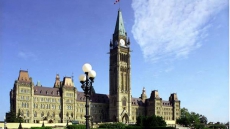VANCOUVER - A pair of court cases that became the rallying point for British Columbia's teachers during the longest provincewide strike in its history goes back on the docket this week, ushering a holdover from the summertime dispute into legal chambers.
The provincial government begins its appeal Tuesday in B.C.'s highest court of a January victory by the B.C. Teachers' Federation, the union representing more than 40,000 public school teachers.
During weeks of demonstrations, news conferences and picket lines, teachers repeatedly trumpeted two B.C. Supreme Court rulings that found the province had violated educators' charter rights.
The court twice ruled it was illegal in 2002 for the province to legislate away hundreds of clauses related to class size and composition from the teachers' collective agreement. Justice Susan Griffin handed down rulings favourable to the union first in 2011 and subsequently last winter.
The province is challenging the latest decision in its bid to claim control of educational policy.
"The issue with the deleted clauses, accordingly, is not simply how much money should be spent on K-12 education but how it is to be spent and who should make such decisions," the government says in documents filed with the B.C. Court of Appeal.
The union, meantime, has held firm to what it views should be its own decision-making powers.
"This appeal is not about government's ability to legislate collective agreement terms that a union views as unfavourable," the union writes in its statement of facts filed in late August.
"This appeal is about fundamental freedoms and teachers' rights protected by ... the Canadian Charter of Rights and Freedoms."
Prof. Charles Ungerleider, an education sociologist at the University of B.C. and a former deputy minister of education, said the appeal court has a task with serious ramifications.
"The court is going to have to wrestle with what counts as educational policy," he said. "That's not a clear cut issue."
A specific example of what's at stake includes whether the union or government should decide the appropriate amount of teacher preparation time within the school day, Ungerleider said. Although that provision has been generally treated as a working condition subject to bargaining, the government could argue prep should be incorporated into the duties of teachers under the School Act.
"Should a government respect a collective agreement that was freely bargained, or can it unilaterally alter such an agreement through legislation by declaring whatever it is they want to change a matter a public policy?" he said. "That's really what's at issue here."
The legal history of the sticking point begins in 2002, when Christy Clark, who was then education minister, introduced legislation that deleted provisions dealing with classroom structure such as class-size limits, formulas and staffing ratios.
The union challenged the legislation, getting a favourable decision in 2011 that restored the contract provisions.
The following year, the government responded by passing new legislation and once again removed the contract clauses. The union mounted its second legal challenge and obtained a second favourable ruling this past January.
Teachers, meantime, had been working without a contract since June 2013. By March, they voted in favour of job action and in April began escalating toward a full-blown strike that commenced in June.
Teachers walked off the job about two weeks before the end of the last school year, staying on the picketlines until a hard-fought deal was finally bargained. Classrooms opened three week delayed, on Sept. 22.
Throughout the strike, BCTF President Jim Iker raised the court victories as an example of the government's unwillingness to bend. The sides haggled over whether a specific clause dealing with classroom and composition should remain in the contract, but eventually both agreed to partition the sticking point and hammer out the remaining terms.
The same day the deal was announced, Iker said the contract's approach to the union's court victories was acceptable.
"For us, an important piece of this collective agreement was ensuring that there was going to be no negotiating away our court rights, as well as the current victory that we had on restoration," he told reporters on Sept. 16.
"That has been protected."
Although many teachers outwardly stated displeasure with the contract overall, the six-year deal was ratified.
Ungerleider said that although the sides return to adversarial roles in court on Tuesday, he hopes they will compartmentalize the issue so as not to prevent positive momentum.
"Let's resolve this fundamental disagreement through an appeal to the courts. And in the meantime, let us establish productive relationships about all the other things that we can agree about."
After several days of hearings, a ruling most likely won't come for months. Regardless of the outcome, the case is likely to head to the Supreme Court of Canada.





